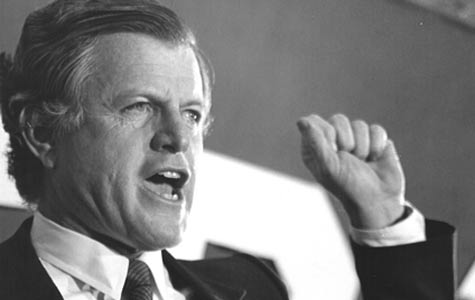
Photo: Bill Madden |
This article was pulled from the 70s Boston Phoenix archives
The broad brush strokes of Teddy Kennedy's presidential announcement may have uplifted liberal hearts, but Jerry Brown's announcement challenged liberal thinking with some pencil-sharp specifics about the role of government in economic planning for the 1980s. While both men portrayed the need for an activist presidency, they did so in rhetorical as antipodal as their personalities.
Resurrecting the cross of Camelot, Kennedy proposed bearing it forth in a crusade "to open widening horizons of opportunity and destiny," to "carry forward the golden promise of America." The way to realize these renascent hopes, Kennedy said by implication, was to change the fellow driving the federal truck. Brown, though no less grandiose in his surmise – "My principles are simple: protect the earth, serve the people and explore the universe" – did not limit his rhetorical argument to questions of who the driver should be. "I see the problem not so much as the deficiency of one personality, " he said, "but rather the collective failure to grasp the new age into which we are entering."
Whereas Kennedy stood surrounded by family, vaguely alluding to solutions that "may follow unfamiliar paths," Brown stood alone, save for a young man translating his words into sign language for the deaf, and charted a more exacting course. He called for a national energy corporation to develop resources on federal land, for public membership on the boards of oil companies, and for prohibition of multinationals' importing oil "except through the agency of the federal government."
A non-aligned liberal Democrat saw the Kennedy-Brown contrast in these terms: "Kennedy's like a locomotive. That's good because a locomotive moves things. But I have no sense of who's driving or how. I don't see a Weltanschauung. Brown is more eclectic, but he at least has a threat that dies his ideas together."
By unveiling more specific policy perspectives, Brown revealed the nakedness of Kennedy's rhetoric about economic recovery. It was the one veil Edward Kennedy would not like to have taken off after the long striptease he has performed in preparation for a formal declaration.
***
The final act of his striptease, as are the final acts of them all, was purely anticlimax for all save the drunk at the end of the bar into whose drink fell some random feathers from the ecdysiastical boa.
In Faneuil Hall last Wednesday, the trumpet hit a high note, the drummer fired off a rim shot, the lights went from light blue to deep red, and, with people yelling and whistling from the back of the room, Ted Kennedy tossed aside the last piece of his brightly sequined non-candidacy. When the house lights came back up, however, some people were wondering if they got what they came to see.
He is the last of them, those three brothers out of whom circumstance and their own drives have drawn a total of eight separate, discernible public personae. The suspicion among those gathered on the bricks of Quincy Market was that there is a ninth and final persona that has yet to emerge, and that it is vital to Ted Kennedy's presidential hopes that he bring it out.